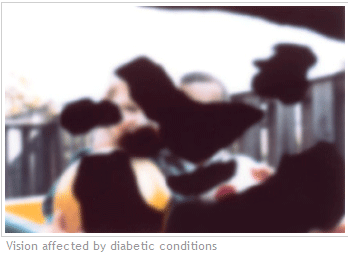
If you have diabetes, you probably know that your blood glucose or blood sugar levels are too high. Over time, this can damage the blood vessels in your eyes resulting in different eye problems. The most common eye problem for people with diabetes is diabetic retinopathy which is the damage of the tiny blood vessels inside the retina. In later stages, the disease may lead to new blood vessel growth over the retina. The new blood vessels can cause scar tissue to develop, which can pull the retina away from the back of the eye. This is known as retinal detachment, and it can lead to blindness if untreated. In addition, abnormal blood vessels can grow on the iris, which can lead to glaucoma. People with diabetes are 25 times more likely to lose vision than those who are not diabetic, according to the American Academy of Ophthalmology.
Diabetic Retinopathy Signs and Symptoms
Everyone who has diabetes is at risk for developing diabetic retinopathy, but not all diabetics do develop it. As soon as you’ve been diagnosed with diabetes, you need to have a dilated eye exam at least once a year. In its early stages, you may not see any symptoms that’s why it can progress unnoticed until it starts to affect your vision. Floaters can be a sign of the disease due to the bleeding from abnormal retinal blood vessels. Sometimes difficulty reading or doing close work can indicate that fluid is collecting in the macula, the most light-sensitive part of the retina. This fluid build-up is called macular edema. Another sign is double vision, which occurs when the nerves controlling the eye muscles are affected. If you experience any of these signs, see your eye doctor immediately. Otherwise, diabetics should see their eye doctor at least once a year for a dilated eye exam. Your eye doctor may diagnose retinopathy using a special test. In this test, dye is injected into the body and then gradually appears within the retina due to blood flow. The illuminated dye in the retina usually tells the doctor how far the disease has progressed.
Diabetic RetinopathyTreatment
Diabetic eye conditions result from complications of diabetes. It leads to a group of eye problems that can cause vision loss and blindness. Diabetic eye disease can damage your blood vessels in the retina that leads to diabetic retinopathy.
Diabetic retinopathy is a common diabetic eye condition and is stated as the leading cause of blindness in adults in America. It results in changes in blood vessels in your retina. For some people afflicted with this eye condition, you will find the blood vessels swelling and leaking fluid. While others have abnormal vessels appear on the retina surface. There is a tissue which is light-sensitive in the back of your eye. In order to have good vision, you need a perfectly normal retina.
Most people who have diabetic retinopathy don’t realize they have the condition because changes to the vision are gradual and slow proceeding. You may not realize at first but over time the condition will worsen and result in loss of vision if left untreated. In addition, it is known to affect both eyes.
When it comes to treatment for diabetic retinopathy, it may not be needed in the first three stages. That is unless you suffer from muscular edema. To prevent the progression of this disease, you should control your blood sugar levels, blood cholesterol, and blood pressure.
Laser surgery is one of the best treatment options for diabetic retinopathy. It is referred to as scatter laser treatment, where the abnormal blood vessels are made to shrink. Your eye surgeon will place laser burns in the area of the retina causing the vessels to shrink. You may be required to come in for one to two sessions for a complete treatment process. This treatment option will certainly save your sight.
Also, laser treatment will work more effectively before the leakage in the new blood vessels begin. Therefore, it is imperative you go in for regular comprehensive eye exams. Even though there is leakage laser treatment is still a possibility depending on the amount of bleeding that has occurred. In case of severe leakage, you will have to undergo surgical procedure referred to as vitrectomy where the blood is removed from the eye.
With a team of specialized doctors and cutting edge technology, diabetic retinopathy treatment is required to minimize the damage caused by this condition. It is also strongly advised that all diabetic patients undergo regular eye exams to prevent vision complications.
- Early Diagnosis with the Optical Coherence Tomography OCT.
- Treatment of the Diabetic macular edema with the Intravitreal injections of Variable Drugs.
- Treatment of the Diabetic retinopathy with the Argon laser photocoagulation.
- Treatment of the Diabetes induced Cataract after special preparation of the eye for the best visual outcome.
Working Hours
Sun, Tue, Wed -
Mon, Thu, Sat -
Friday -
9 AM - 6 PM
9 AM - 5 PM
Closed
Contact Us
- Villa 32 A, Jumeirah Beach Road, 4 A Street (behind the Village Mall)
- +971 4 344 01 22
- info@ebsaar.com